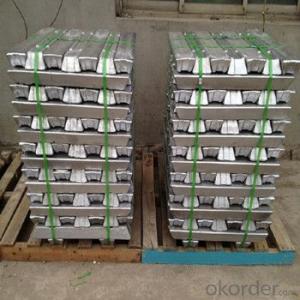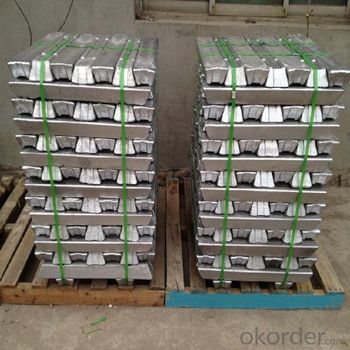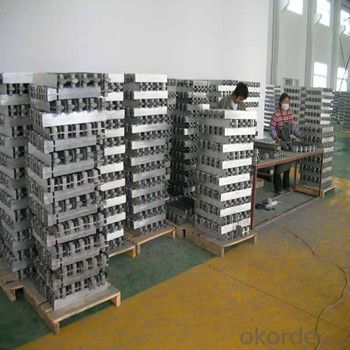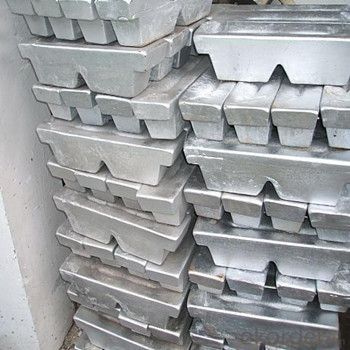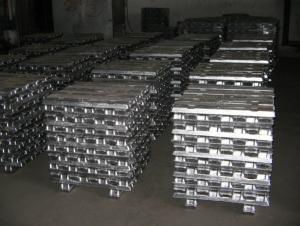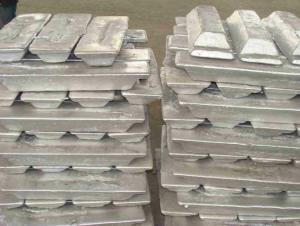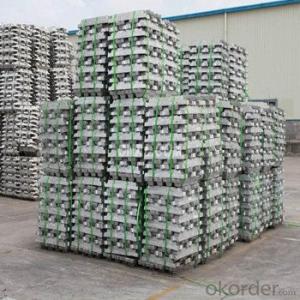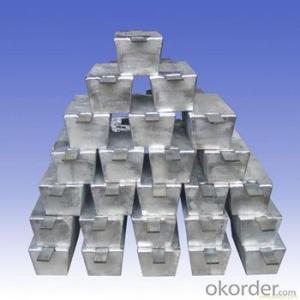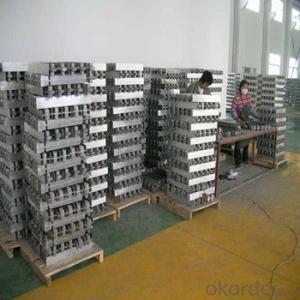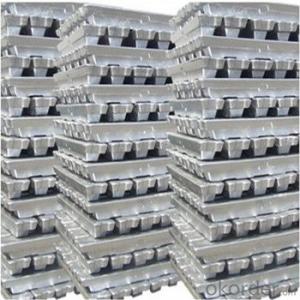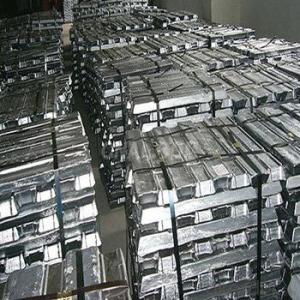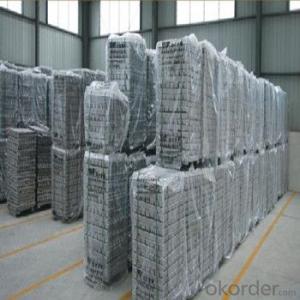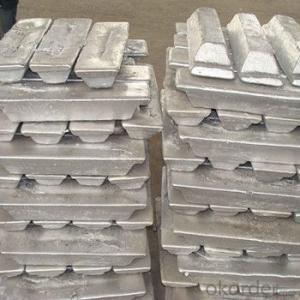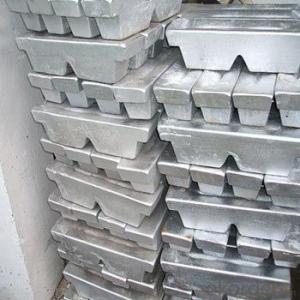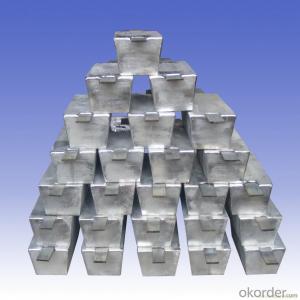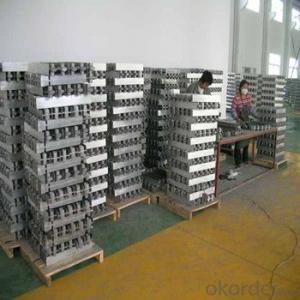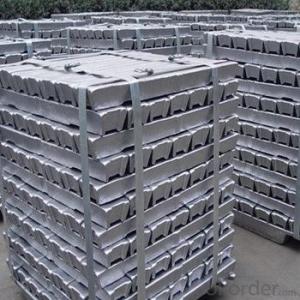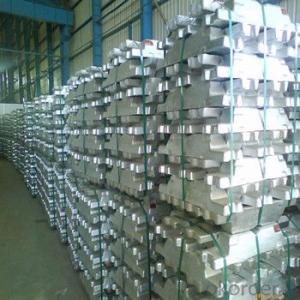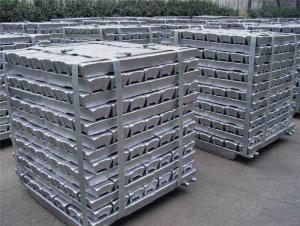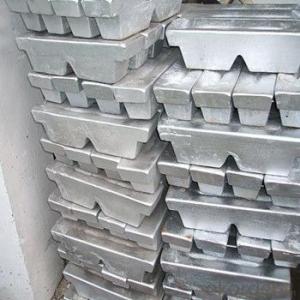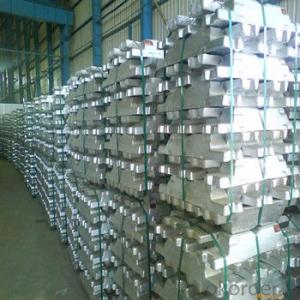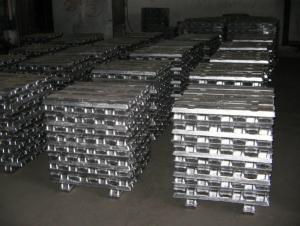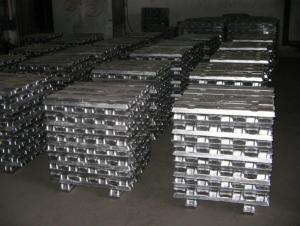Aluminium Ingot With Factory Price High Purity 99.7%
- Loading Port:
- China main port
- Payment Terms:
- TT OR LC
- Min Order Qty:
- 1000 m.t.
- Supply Capability:
- 10000 m.t./month
OKorder Service Pledge
OKorder Financial Service
You Might Also Like
Pure Aluminum Ingot Used for Industry
1.Structure of Aluminum Ingot Description
Aluminum ingot for remelting is produced by molten salt electrolysis method using alumina and cryolite. Products meet the national standard GB/T1196-2002. The surface of ingot is clean and smooth. An ingot is a piece of material, usually metal, that is cast into a shape suitable for further processing. Insteelmaking, it is the first step among semi-finished casting products. Ingots usually require a second procedure of shaping, such as cold/hot working, cutting, or milling to produce a useful final product.
2.Main Features of the Aluminum Ingot
•High Purity
•High strength
•Fast melting
•Best price
•Good after-service
3. Aluminum Ingot Images
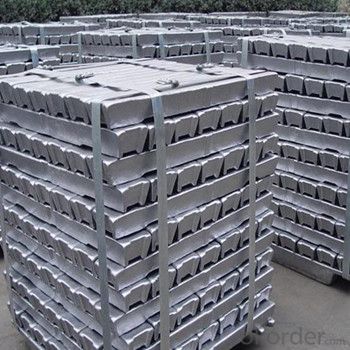
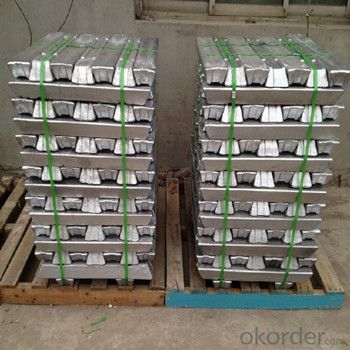
4. Aluminum Ingot Specification
Grade | Chemical Composition % | |||||||||
Al≥ | impurities ≤ | |||||||||
Si | Fe | Cu | Ga | Mg | Zn | Mn | others | Sum | ||
Al99.9 | 99.90 | 0.50 | 0.07 | 0.005 | 0.02 | 0.01 | 0.025 | - | 0.010 | 0.10 |
Al99.85 | 99.85 | 0.80 | 0.12 | 0.005 | 0.03 | 0.02 | 0.030 | - | 0.015 | 0.15 |
Al99.7 | 99.70 | 0.10 | 0.20 | 0.010 | 0.03 | 0.02 | 0.030 | - | 0.030 | 0.30 |
Al99.6 | 99.60 | 0.16 | 0.25 | 0.010 | 0.03 | 0.03 | 0.030 | - | 0.030 | 0.40 |
Al99.5 | 99.50 | 0.22 | 0.30 | 0.020 | 0.03 | 0.05 | 0.050 | - | 0.030 | 0.50 |
Al99.00 | 99.00 | 0.42 | 0.50 | 0.020 | 0.03 | 0.05 | 0.050 | - | 0.050 | 1.00 |
5.FAQ of Aluminum Ingot
We have organized several common questions for our clients,may help you sincerely:
①How about your company?
A world class manufacturer & supplier of castings forging in carbon steel and alloy steel,is one of the large-scale professional investment casting production bases in China,consisting of both casting foundry forging and machining factory. Annually more than 8000 tons Precision casting and forging parts are exported to markets in Europe,America and Japan. OEM casting and forging service available according to customer’s requirements.
②How to guarantee the quality of the products?
We have established the international advanced quality management system,every link from raw material to final product we have strict quality test;We resolutely put an end to unqualified products flowing into the market. At the same time, we will provide necessary follow-up service assurance.
③How long can we receive the product after purchase?
In the purchase of product within three working days, We will arrange the factory delivery as soon as possible. The pecific time of receiving is related to the state and position of customers.Commonly 7 to 10 working days can be served.
- Q: How are aluminum ingots used in electrical wiring?
- Aluminum ingots are used in electrical wiring as a raw material for manufacturing aluminum wires and cables. These ingots are melted down and then processed to form long, thin wires that are used for conducting electricity in various applications such as residential, commercial, and industrial buildings. Aluminum wiring is preferred for its high conductivity, lightweight nature, and cost-effectiveness, making it a suitable choice for transmitting electrical currents efficiently.
- Q: What are the different casting methods used for aluminum ingots?
- There are several different casting methods that are commonly used for producing aluminum ingots. These methods include: 1. Permanent Mold Casting: In this method, a permanent mold made of iron or steel is used to shape the molten aluminum into ingots. The mold is preheated and coated with a release agent to prevent sticking. The molten metal is poured into the mold, allowed to solidify, and then the mold is opened to remove the ingot. 2. Continuous Casting: This method involves pouring the molten aluminum into a water-cooled mold that has a continuous cavity. As the metal solidifies, it is continuously pulled out of the mold, resulting in a continuous strand of aluminum ingots. This method is often used for producing large quantities of ingots with a consistent shape. 3. Sand Casting: Sand casting is a widely used method for casting aluminum ingots. A pattern of the desired ingot shape is created using sand, and then a mold is made by packing the sand around the pattern. The molten aluminum is poured into the mold and allowed to cool and solidify. Once solid, the sand mold is broken apart to reveal the ingot. 4. Die Casting: Die casting is a method that is commonly used for producing small to medium-sized aluminum ingots with intricate details. In this process, a steel mold, called a die, is used. The molten aluminum is forced into the die under high pressure, and then the metal is rapidly cooled to solidify. The die is opened, and the ingot is ejected. 5. Centrifugal Casting: In this method, the molten aluminum is poured into a rotating mold. The centrifugal force causes the metal to spread out and solidify against the mold walls, resulting in a cylindrical ingot. This method is particularly useful for producing hollow or tubular ingots. Each casting method has its own advantages and disadvantages, and the choice of method depends on factors such as the desired ingot shape, size, quantity, and the specific requirements of the application.
- Q: How are aluminum ingots used in the production of consumer goods?
- Aluminum ingots are widely used in the production of consumer goods due to their versatility and desirable properties. These ingots are first melted and then transformed into various forms, such as sheets, bars, or coils, to suit different manufacturing processes. One common application of aluminum ingots is in the production of packaging materials. Aluminum foils and cans are lightweight, corrosion-resistant, and malleable, making them ideal for preserving food and beverages. The ingots are rolled into thin sheets, which are then used to create these packaging materials. Another major usage of aluminum ingots is in the automotive industry. Aluminum's low density and high strength-to-weight ratio make it an excellent choice for manufacturing car parts, such as engine components, body panels, and wheels. By using aluminum ingots, automakers can produce lighter vehicles, resulting in improved fuel efficiency and better performance. Additionally, aluminum ingots find applications in the construction sector. The ingots are often extruded into profiles that are used for windows, doors, and curtain walls. Aluminum's corrosion resistance and ability to withstand extreme weather conditions make it a popular choice for such building materials. Furthermore, aluminum ingots are utilized in the production of consumer electronics. The lightweight nature of aluminum makes it an ideal material for manufacturing laptops, tablets, and smartphones, where the reduction of weight is crucial for portability. The ingots are processed into casings, frames, and other components for these electronic devices. Overall, aluminum ingots play a vital role in the production of a wide range of consumer goods. Their versatility, lightweight nature, and corrosion resistance make them ideal for various applications, including packaging, automotive, construction, and electronics industries.
- Q: Could you tell me how to calculate the value of aluminum material? By weight or by length or by other means?
- By weight, like steel.Different materials of aluminum and aluminum prices are different, different shapes of the price is not the same.
- Q: Can aluminum ingots be customized for specific applications?
- Yes, aluminum ingots can be customized for specific applications. Aluminum is a highly versatile metal that can be easily manipulated to meet various requirements. The customization process typically involves alloying the aluminum with other elements to enhance its properties such as strength, hardness, corrosion resistance, and thermal conductivity. Additionally, the ingots can be subjected to various heat treatment processes like annealing, quenching, and tempering to further modify their properties. This allows for the production of aluminum ingots that are tailored to specific applications, ranging from automotive parts and aerospace components to construction materials and consumer products.
- Q: Can aluminum ingots be used in medical applications?
- Yes, aluminum ingots can be used in certain medical applications. Aluminum is lightweight, non-toxic, and has excellent corrosion resistance, making it suitable for medical devices such as orthopedic implants, prosthetics, and surgical instruments. However, it is important to note that aluminum should meet specific medical grade standards to ensure its safety and compatibility with biological systems.
- Q: Aluminum sold alone, high benefit ah, why do aluminum ingot?
- No, aluminium powder is made of aluminium ingots
- Q: Does aluminum ingots produced without aluminum ore belong to metal smelting?
- The production of aluminium ingots without aluminum ore belongs to metal smelting.Without the use of aluminum ore, aluminum is also extracted from the compound and turned into free aluminum
- Q: What is the purity level of aluminum in an ingot?
- Depending on the specific manufacturing process and intended application, the purity level of aluminum in an ingot can vary. Typically, aluminum ingots have a purity level ranging from 99.7% to 99.9%. This indicates that the ingot consists of at least 99.7% to 99.9% pure aluminum, with the remaining percentage comprising impurities and trace elements. Additional refining processes such as electrolysis make it possible to achieve even higher levels of purity, such as 99.99% or even 99.999%. The specific industry or application in which the aluminum will be used determines the desired purity level, as certain industries may require higher levels of purity to ensure optimal performance and quality.
- Q: I would like to ask, aluminum water poured into the mold, what should pay attention to? Aluminum solidification in the mold after the aluminum ingot, how can I get it out?
- When the mould is opened, the hammer is used to mark the template, and the 4 shafts on it strike another template to make it open. Die casting equipment is generally equipped with a die, directly push the sub templates, mold opening.
Send your message to us
Aluminium Ingot With Factory Price High Purity 99.7%
- Loading Port:
- China main port
- Payment Terms:
- TT OR LC
- Min Order Qty:
- 1000 m.t.
- Supply Capability:
- 10000 m.t./month
OKorder Service Pledge
OKorder Financial Service
Similar products
Hot products
Hot Searches
Related keywords
